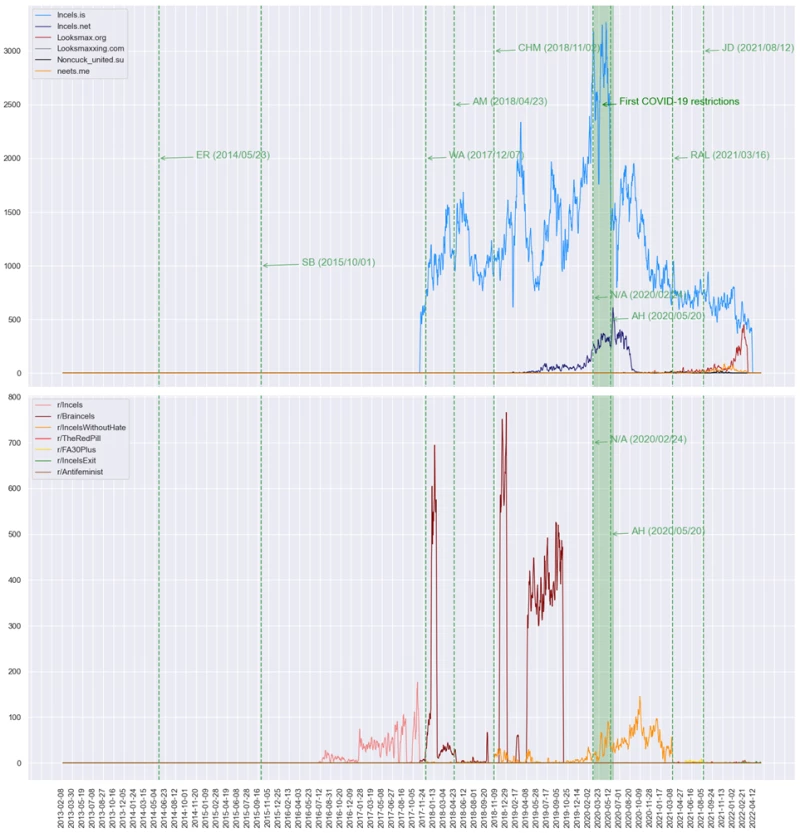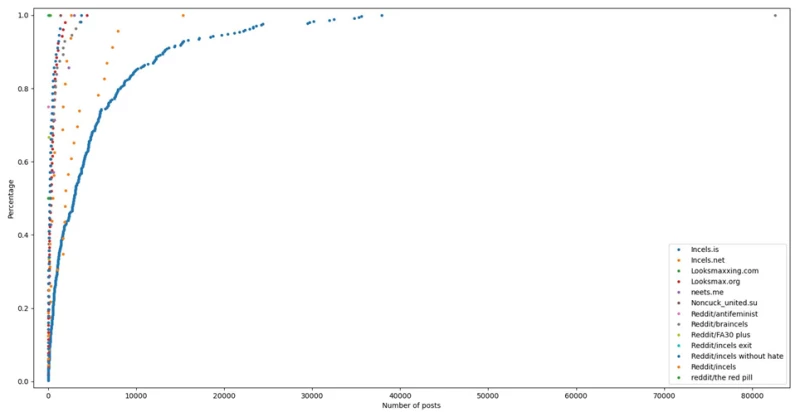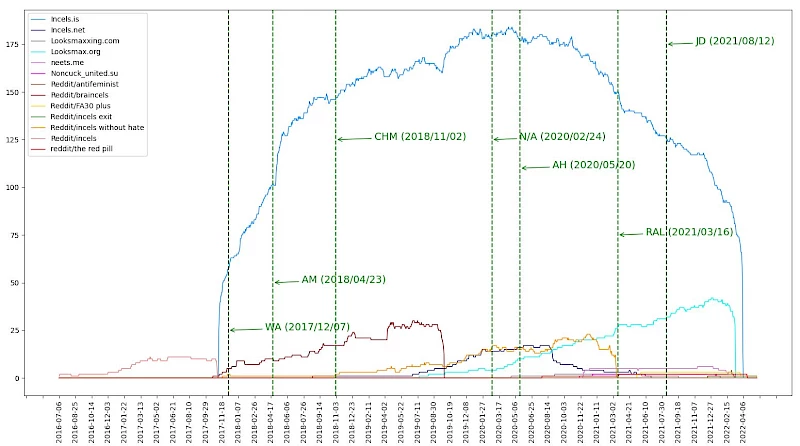Methodology
Research has shown that discussions taking place on the incelosphere contain highly problematic language, with some arguing that the incel subculture exhibits all of the characteristics of an extremist ideology (Baele, Brace and Coan, 2019; Jaki et al., 2019), consisting of structured opposition between an in-group and harmful out-group(s), with intergroup competition being presented in the form of a crisis-solution narrative (see Berger, 2018).
Unfortunately, acts of incel-related violence have resulted in the deaths of roughly 100 people since Elliot Roger’s Isla Vista spree killing in 2014. Despite this, however, it is important to note that the vast majority of adherents to this belief system are not violent, with recent research highlighting that not all incels condone violence (Moskalenko et al., 2022), and that a lot of incel content exhibits typical anxieties of young men transitioning to adults (O’Malley, Holt and Holt, 2020).
While the incel subculture appears to have originally developed within the USA and Canada, several recent incidents have shown that there is now engagement with the incelosphere within Europe. As such, using the dataset constructed by Baele, Brace and Ging (2023), which consists of every post made to 32 different incel online spaces, an explorative piece of analysis was conducted in an attempt to evaluate the amount of engagement with incel online spaces within the UK. In doing so, a multi-step process was adopted to create a sub-dataset of 2,314,866 posts and accompanying metadata made to various forums and sub-Reddits by individuals who claimed to have been based in the UK.
Analysis of this UK dataset showed that the daily number of posts for UK-based users broadly followed the same pattern seen across all users on these platforms, just with fewer users. There was also little engagement from UK-based users with the incelosphere during 2016-2017, when it was predominantly a series of sub-Reddits. After this point, the forums were much more popular amongst UK-based users.
Figure 1 shows the number of daily posts made by UK-based posters for each specific forum (top) and sub-Reddit (bottom) in the UK dataset. It shows that Incels.is has acted as the long-standing anchor of the incelosphere and has historically been the most popular incel online space amongst UK-based users, as measured by its number of daily posts. This mirrors what is seen in the incelosphere as a whole (Baele, Brace and Ging, 2023). While peak engagement with the incelosphere as a whole occurs around the time of Alek Minassian’s 2018 Toronto van attack, peak engagement for UK-based users instead coincides with the introduction of the first COVID-19 restrictions in Europe and the USA.
Regarding individual users, Figure 2 uses an empirical cumulative distribution function (ECDF) to display the distribution of the posts made by UK-based users, represented as a proportion on the y-axis, for each distinct online space in the data. In doing so, it demonstrates that the vast majority of UK-based engagement on the incelosphere occurs on Incels.is. Incels.net then comes in as the second online space with most UK engagement.
By taking the date of the first and last post made by each user, and for every date in between, adding one to the tally of ‘active users’ for the given date on that specific platform, it was possible to estimate the number of users who had identified themselves as being based in the UK on each online space over time. While this is not a perfect measure, it is the best possible measure given the nature of these online spaces. In doing so, Figure 3 shows that the first dedicated incel online space, the sub-Reddit r/Incels, had a maximum of 16 unique users who identified themselves as being based in the UK. The successor to this platform, the sub-Reddit r/Braincels, then slowly increased the number of UK-based users throughout 2018 and eventually peaked at 56. However, it is again Incels.is that has the highest number of UK-based users, which increases sharply during the first few months of the forum being active, before switching to a slower rate of increasing users. It then reaches its peak at the time of the introduction of the first COVID-19 restrictions in Europe and the US, with 369 users identifying themselves as being based in the UK. However, despite these increasing numbers, it is worth noting that users who identified themselves as being UK-based make up a relatively very small proportion of the total number of users on these online platforms (Table 1).
| Platform | Number of users | Number of UK-based users | Proportion of UK-based users |
|---|---|---|---|
| Incels.is | 369 | 10,408 | 0.035 |
| Incels.net | 23 | 2,818 | 0.008 |
| Looksmaxxing.com | 2 | 223 | 0.008 |
| Looksmax.org | 52 | 4,094 | 0.012 |
| Neets.me | 7 | 281 | 0.024 |
| Noncuck.su | 2 | 161 | 0.012 |
| r/Antifeminist | 4 | 3,508 | 0.001 |
| r/Braincels | 56 | 30,973 | 0.001 |
| r/FA30Plus | 3 | 1,530 | 0.001 |
| r/Incelexit | 1 | 2,155 | 0.000 |
| r/incelswithouthate | 56 | 39,474 | 0.001 |
| r/Incels | 16 | 35,119 | 0.000 |
| r/Theredpill | 2 | 9,835 | 0.000 |
| All platform total | 593 | 140,651 | 0.103 |
Table 1. Proportions of all users on each online space that is self-identified as being UK-based.
Figure 1: Number of posts made to individual forums (top) and sub-Reddits (bottom) by UK-based users. 5-day rolling average.
Figure 2: ECDF showing what percentage of UK-based posters (y-axis) have specific number of posts (x-axis) per individual online space.
Figure 3: Number of users who identified themselves as being based in the UK over time and across online spaces.
Summary
In summary, while engagement from UK-based users with the incelosphere has increased, the patterns of engagement exhibited by these users mirrors that seen by all users on the incelosphere. However, it is important to note that while there may have been an increase in engagement from UK-based users in recent years, the analysis summarised here indicates that these users still only make up a very small proportion of all users on the incelosphere.
The analysis presented here is a short form summary of that presented in the full Con.Cel report. You can download the full report here as well as policy brief, which delves in the data-driven analysis of incelospher engagement by UK-based users, featured in the full report.
Copyright Information
As part of CREST’s commitment to open access research, this text is available under a Creative Commons BY-NC-SA 4.0 licence. Please refer to our Copyright page for full details.
IMAGE CREDITS: Copyright ©2024 R. Stevens / CREST (CC BY-SA 4.0)









